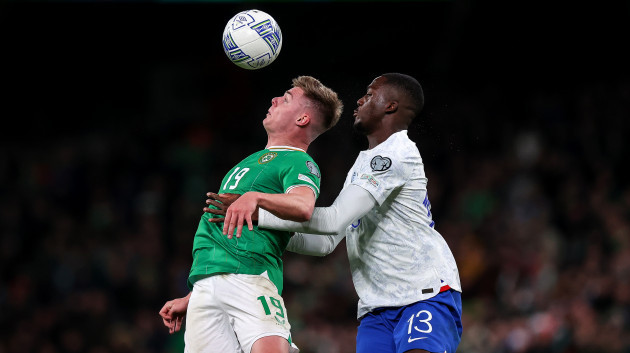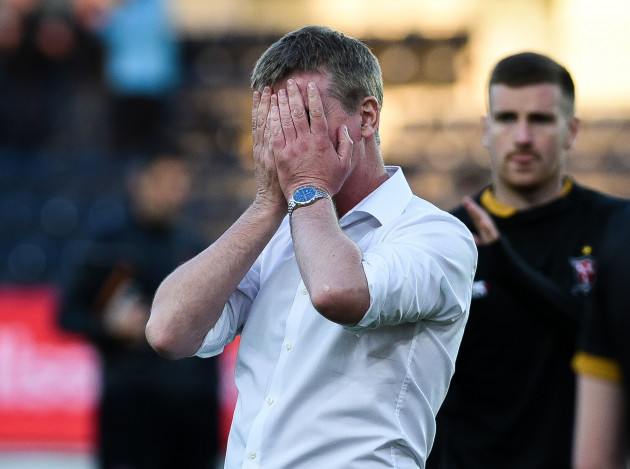WHILE SOME NATIONAL teams are only linking up today for their June qualifiers, the Irish squad have been sweating away for a week already.
But there are worse places to work than their five-star resort in Antalya, which features a golf course, swimming pools, tennis courts, and a bowling alley, allowing the players to unwind around training sessions beneath a pitiless sun.
It’s a plush workspace, and there hangs behind the reception desk a large signed photograph of Barack Obama, who stayed here in 2015 when he was in town for a G20 summit.
The Irish squad have been here before, during a very low-key international window in 2018, a time when the manager was Martin O’Neill and the most significant member of the party was Declan Rice.
That was back in the uncompetitive slough after missing out on the 2018 World Cup, but the stakes are much higher now, as Ireland bid to shake off their ring-rust and adjust to the heat for next Friday’s Euro 2024 qualifier against Greece. It is a game that may define this qualification campaign if not Stephen Kenny’s entire reign as manager.
Mitigating against a six-week gap between the end of the EFL season and kick-off in Athens has been the main thrust behind this training camp in Turkey, which forms only the last part of the build-up. Championship and League One players gathered for a four-day camp in Bristol last month, and all were then given individual programmes tracked by Stat Sports. The Irish management team had access to all of that data so there was no hiding place.
Training on Wednesday featured a trio of 11v11 games lasting 12 minutes each, with a side resembling the XI that will play next Friday playing against an Irish side lined out in a 4-3-3 formation to best mimic Greece.
The players were given a rest day on Thursday and then trained again on Friday, and then at 7.30pm on Saturday evening lined out for a 70-minute match with the same parameters as the trio of games from earlier in the week. It was an internal game as the FAI couldn’t find suitable opponents for the game, the best option being Kyrgyzstan’s U23s. It was wrapped up in time to watch the Champions League final, which kicked off at 10pm local time.
The good news from the internal game is that there are no injury problems. Alan Browne played 30 minutes having had his week curtailed by a calf problem, while Troy Parrott sat out the game as a precaution with a tight groin. Adam Idah played only a few minutes as he was feeling unwell but is expected to be fine by the time the Greece game comes around.
Part of the rationale for picking Antalya was to expose the players to conditions slightly more difficult than those they will face in Athens, where it should be a few degrees cooler than the 27 degrees they played through on Saturday night.
“That was an objective of last night, to play as intense a 70 minutes as we could and not get any injuries”, said Stephen Kenny in conversation with the travelling media at the Irish team hotel in Antalya.
Kenny covered a lot of ground across a 45-minute chat, at one point revealing that Pat O’Sullivan made numerous attempts to convince him to manage Limerick FC. The conversation helicoptered away to talk about the state of Irish football overall, but it began with a sharp focus on Greece.
He was naturally coy on team selection and which of his 3-4-3/3-5-2 systems he will land on for the game in Athens.
“We’ve 25 players with 22 clubs”, said Kenny, “they all have different ways of playing, some of them have had different club managers this year. The messages they are getting, the systems they are playing: they are different. You can go from November to March, and March to June and they don’t just remember everything. You’ve got to revisit, 3-4-2-1, 3-4-3, 3-5,2 the differences, nuances within that. The tactical nuances and the roles and responsibilities of each player in and out of possession, that’s something you have to get right.”
Evan Ferguson will start against Greece and Kenny says the teenager is comfortable in either system. “Life gives you opportunities and he’s certainly grasped the opportunity”, said Kenny of Ferguson’s breakout year. “It’s terrific he did that. He’s been an addition to us. The forwards have had varying seasons but they’re all talented and they can all come good.”
If Ireland want a little more midfield guile against Greece then Will Smallbone will come into the midfield picture, with Kenny taking the diplomatic route in response to the question by saying Smallbone has given him something to think about.
Unlike many of his predecessors, Kenny has lots to say about Irish football more broadly, and so he fields plenty of questions on matters away from the pitch. Turkey is now the land of the new Shelbourne owner, Acun Ilıcalı, an investment Kenny welcomed when he was asked about it.
“I think any investment in the clubs is positive. Dermot Desmond going into Shamrock Rovers which was very influential, and just great for the League and great for Rovers. You’ve good owners coming in now at the various clubs and that wasn’t always the case in the League. You had committees, a lot of committees running clubs for a long time and people with good intentions and certainly great people but just maybe didn’t have the financial backing sometimes.” The addition of the Uefa Conference League makes Irish clubs more attractive, he said, speaking with a kind of baffled lament that there was no safety net for his Dundalk when they pushed Rosenborg all the way in the Champions League qualifiers back in 2017.
Broader Irish football issues are in the news nowadays, following the FAI’s release of their infrastructure plan, which is a €863 million menu of 2500 facility projects needed to address ramshackle facilities.
“It’s brilliant from the FAI’s point of view that everyone who worked on the plan, to have the vision and fortitude and expertise in such a short space of time to put that plan together and actually put it to Government”, said Kenny.
“It’s incredibly ambitious and that’s what you need, that level of ambition. It’s for all strands of the game. I was talking about 20,000-seater stadiums in provincial towns or cities, if things like that happen it’s bigger than sport itself. It actually affects communities in a huge way. It forms the environment of a provincial town or city and clubs get the opportunity to grow if academies are funded in a proper way and it coexists with education. It’s a great opportunity for a club to grow in its community.
“It’s hard for people in provincial towns. Out of loyalty they will go to poor grounds that are falling down, for their club. But to go to proper grounds brings the whole family into the equation and can be just a better environment for that. I think it’s powerful in that regard. Very powerful.”
Kenny gave a manager’s perspective on the vicious cycle that becomes of a sport without an industry.
“It has always been said here that there is not a proper industry, so if somebody loses their job they have nowhere to go. They have to go back to mainstream employment and then, do they come back out of that again? Does the employer want to take a coach back in, knowing that he might go back coaching? The coach has to put his family first? An industry creates that level of stability.”
The FAI bluntly stated last week that the sport has suffered under-investment from the State over the last 25 years, and when Kenny was asked if he was frustrated at that lack of State support. He paused for long enough to suggest he wasn’t sure whether this was the right week to create a headline.
“It was frustrating because my ambition was to try and get a team into the Champions League. But then that became harder, they introduced extra rounds, but the Europa League, we aimed to do well at that level. I think if I hadn’t taken the Irish job we would have got back into the Europa League with that Dundalk. I am certain of that. We would have definitely done that.
“What I will say, you were just let down by all the stuff around you, you couldn’t attract top players. It was not just a wage, you have to have an infrastructure. Proper training facilities, proper stadiums. It is very difficult to even attract the best Irish players in the UK who might be dropping down the divisions. They need to come into an environment that is … we trained in Bristol City a few weeks ago. A very, very modern state of the art training facilities, with everything from cryotherapy chambers to modern gyms, pitches of the highest quality. It is a proper industry with people working at all levels.”
Of course, the FAI need to make their own contribution to their overhaul plan, and the quickest access to a windfall remains qualification for a senior men’s tournament. Ambitions both short and long term collide next Friday, and the hotel bill in Antalya will be cheap if it earns Ireland an edge in Athens.



